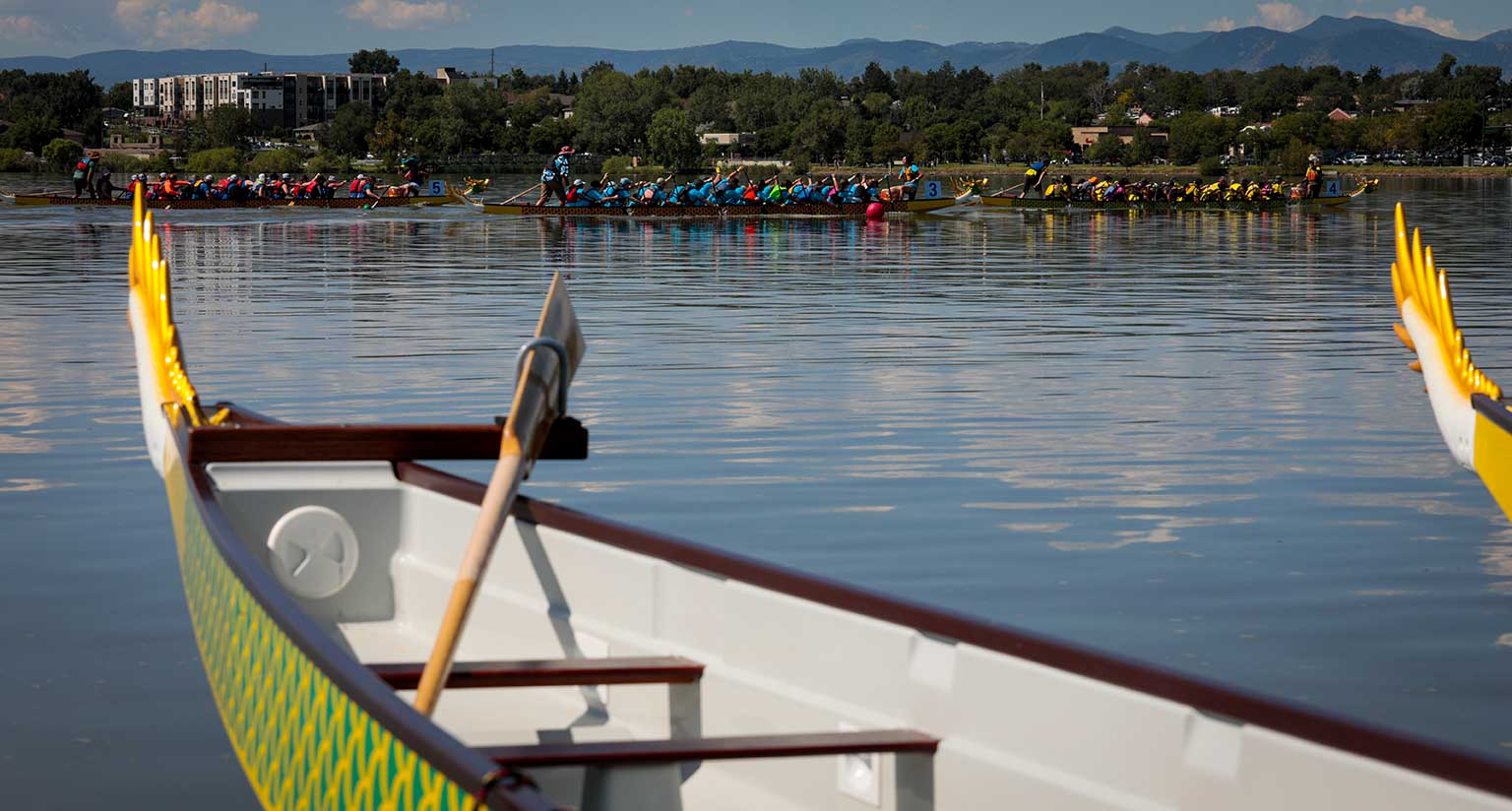
Dragon boats race across Sloan’s Lake in Denver at the Colorado Dragon Boat Festival on Saturday, July 22. Photo by Joe Mahoney / Special to The Colorado Trust
Dragon boats race across Sloan’s Lake in Denver at the Colorado Dragon Boat Festival on Saturday, July 22. Photo by Joe Mahoney / Special to The Colorado Trust
A burst of wind and threatening clouds scuttled the last race of the Colorado Dragon Boat Festival, held at Denver’s Sloan’s Lake last weekend.
Boats were called in off the water before the top three teams could paddle their final heat in the competitive 200-meter Hong Kong boat race on Sunday, July 23. Race organizers used the times in the previous heats to calculate the gold medal winner of the premier racers: LBT, a team affiliated with Denver’s Lao Buddhist Temple.
A day earlier, the Flying Dragons pulled ahead of its competitors in the dramatic final seconds to win the 400-meter race.
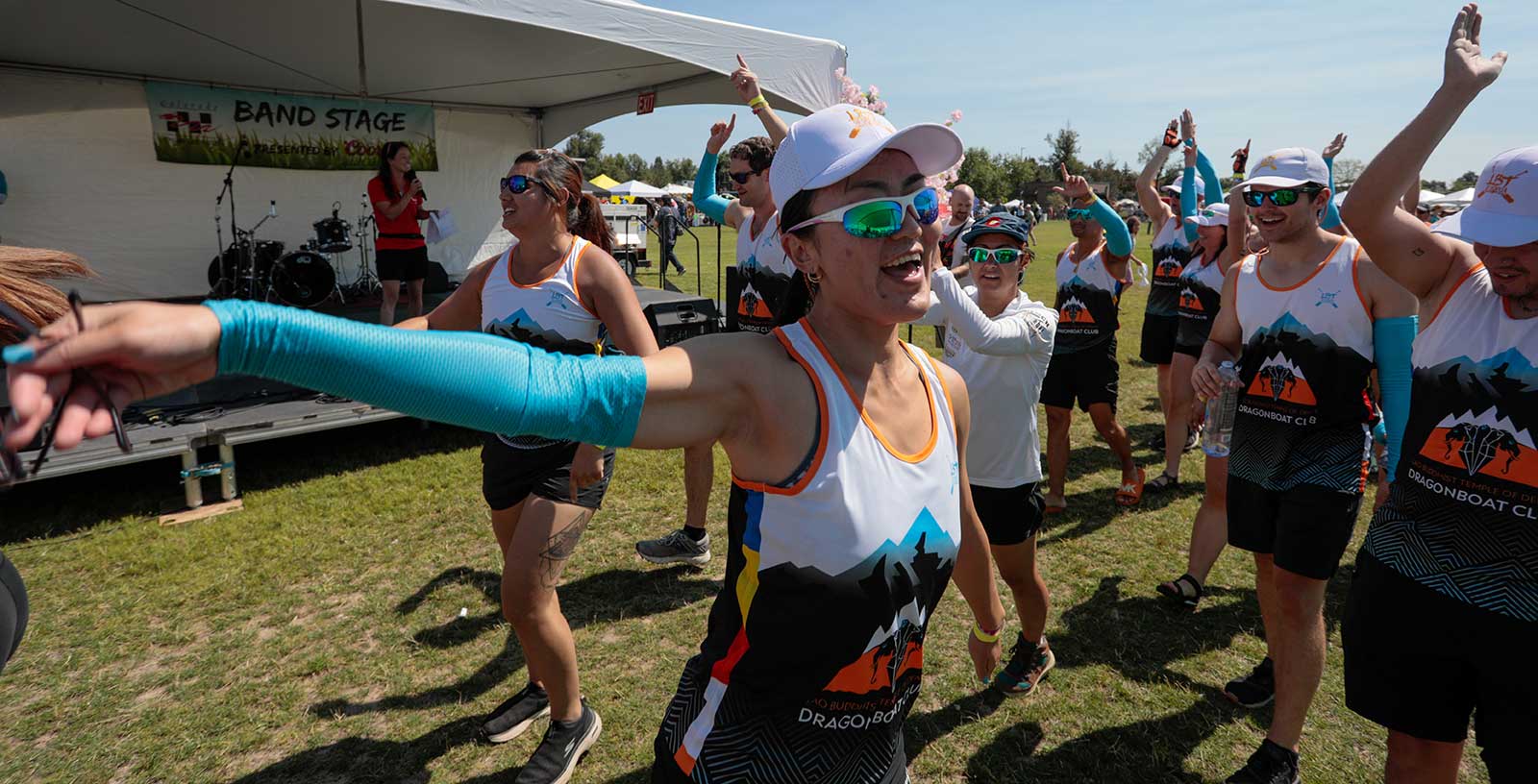
Members of the Lao Buddhist Temple dragon boat team danced past the band stage at the festival’s opening ceremony on July 22. Photo by Joe Mahoney / Special to The Colorado Trust
Of course, most of the tens of thousands of Coloradans who attended the festival were there to eat dumplings, pho and katsu; drink boba tea, pineapple drinks and sugarcane juice; and compete for a slice of shade from the blazing sun as they took in performances of Hawaiian, Cambodian and Chinese dance, kung fu and karate.
There is plenty to recommend dragon boating as a spectator sport, or a once-a-year lark. Most of the teams that competed were recreational ones, each with a person lying atop the head of a dragon at the helm of the boat to catch flags at the finish line, and win glory.
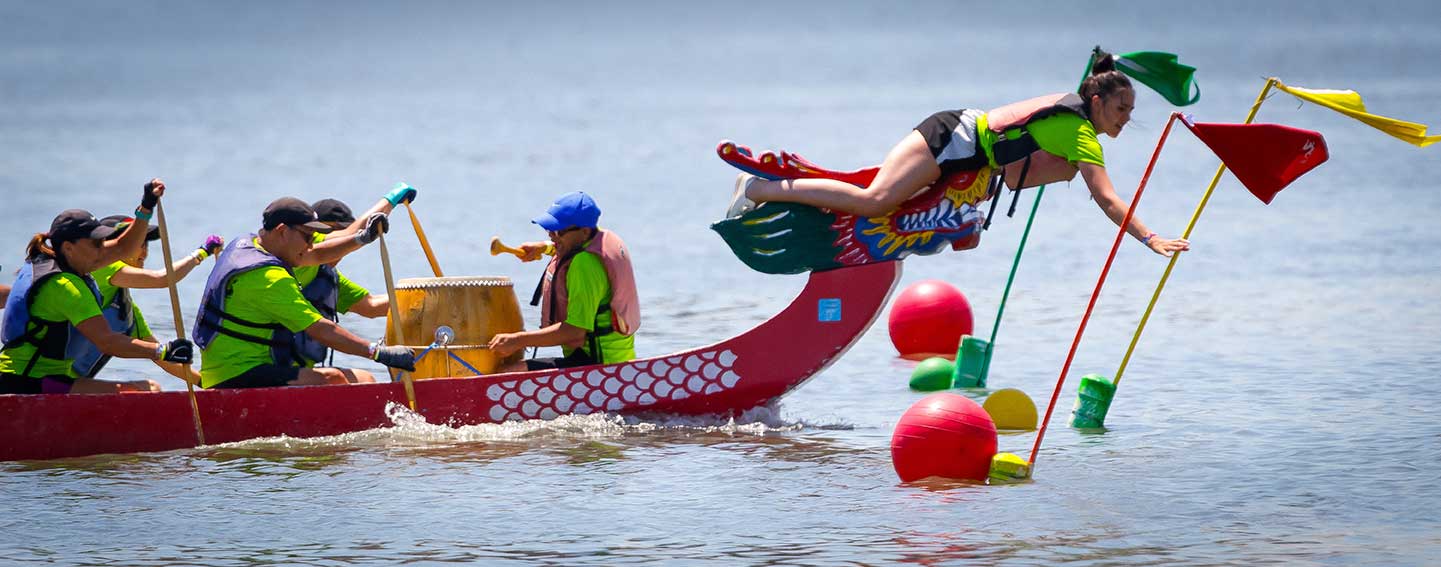
The CoBank dragon boat team caught the flag at the finish line. Photo by Joe Mahoney / Special to The Colorado Trust
This was the second year that the festival has gathered in person since COVID-19 shut down the festival in 2020 and 2021. Those setbacks could have sunk the festival by depriving it of its main revenue source for two years running.
Instead, the free festival has come out stronger.
This year, according to festival director Sara Moore, there were at least 80 performers, 27 vendors and 40 dragon boat teams. Estimates suggest attendance reached a record 200,000 to 250,000 people—that’s more than attended this year’s dragon boat festival in Hong Kong, or the two Taylor Swift shows in Denver the previous weekend.
The triumphant return of the festival is a testament to the communities it has helped build and sustain, according to local leaders. It’s also a reflection of the strength of the Asian American community in Colorado, which suffered some of the biggest hits during the early months of the pandemic.
“During the pandemic, our community went through so much,” says Fran Campbell, who leads the Asian Chamber of Commerce in Denver. “Asian businesses lost 50 percent of their foot traffic, not to mention the vandalism and the assaults.”
Anti-Asian hate crimes spiked, nationally and in Colorado, as a result of toxic rhetoric from then-President Donald Trump and his allies that vilified China and Chinese people for the spread of the virus.
“Maybe the silver lining of the pandemic was that it brought our community closer together and gave us a stronger unified voice, and the dragon boat festival is definitely a continuing signature of that,” says Campbell.
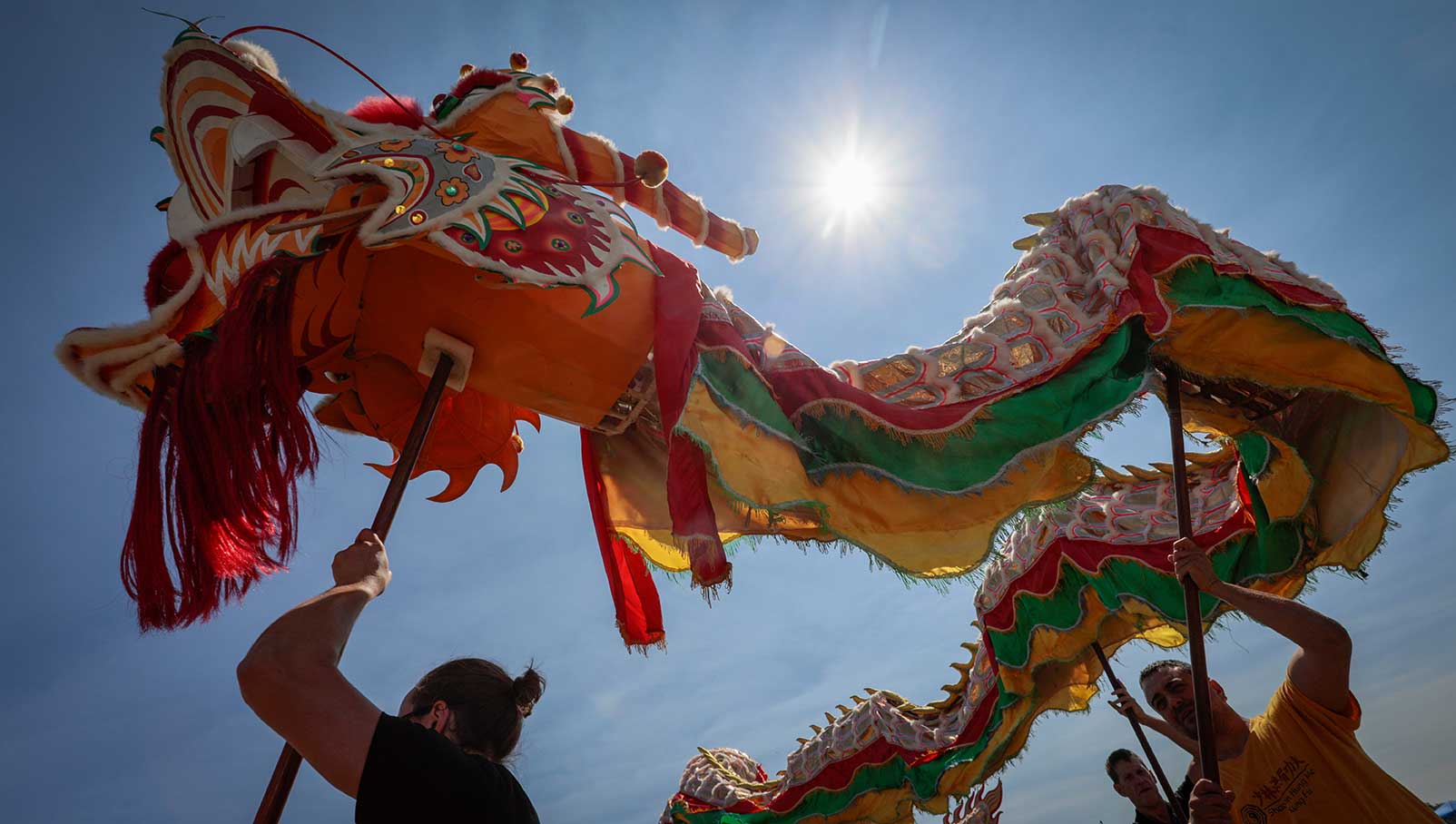
A dragon dance kicked off the festival. Photo by Joe Mahoney / Special to The Colorado Trust
The Asian American community in Colorado is small but growing quickly. In 2000, just before the first dragon boat festival was held in Denver, there were 130,932 Coloradans who identified themselves as Asian American, Native Hawaiian or Pacific Islanders (AANHPI), or about 3% of the total population, according to census data. By 2020, there were 310,498 AANHPI Coloradans, or 5.3% of the population.
Annie Guo VanDan, who leads the Colorado Asian Culture and Education Network, says she’s enjoyed watching the festival grow from its first event of about 16,000 people in 2001. VanDan was in high school then, and helped direct traffic.
“I think it’s very significant to a lot of people in the Asian American, Native Hawaiian and Pacific Islander communities, especially people who grew up here and didn’t see ourselves reflected in many spaces in Colorado,” says VanDan. “It was the first time we saw people come together in one space, celebrating around the idea of dragon boating.”
Harry Budisidharta, who leads the Asian Pacific Development Center in Aurora (a past Colorado Trust grantee), says the festival is both a sign of the growing strength of the community in Colorado, and a cause of it.
“Having such a large and visible festival shows to the community that this is a welcoming state, that we support the community and that there are allies and resources,” he says.
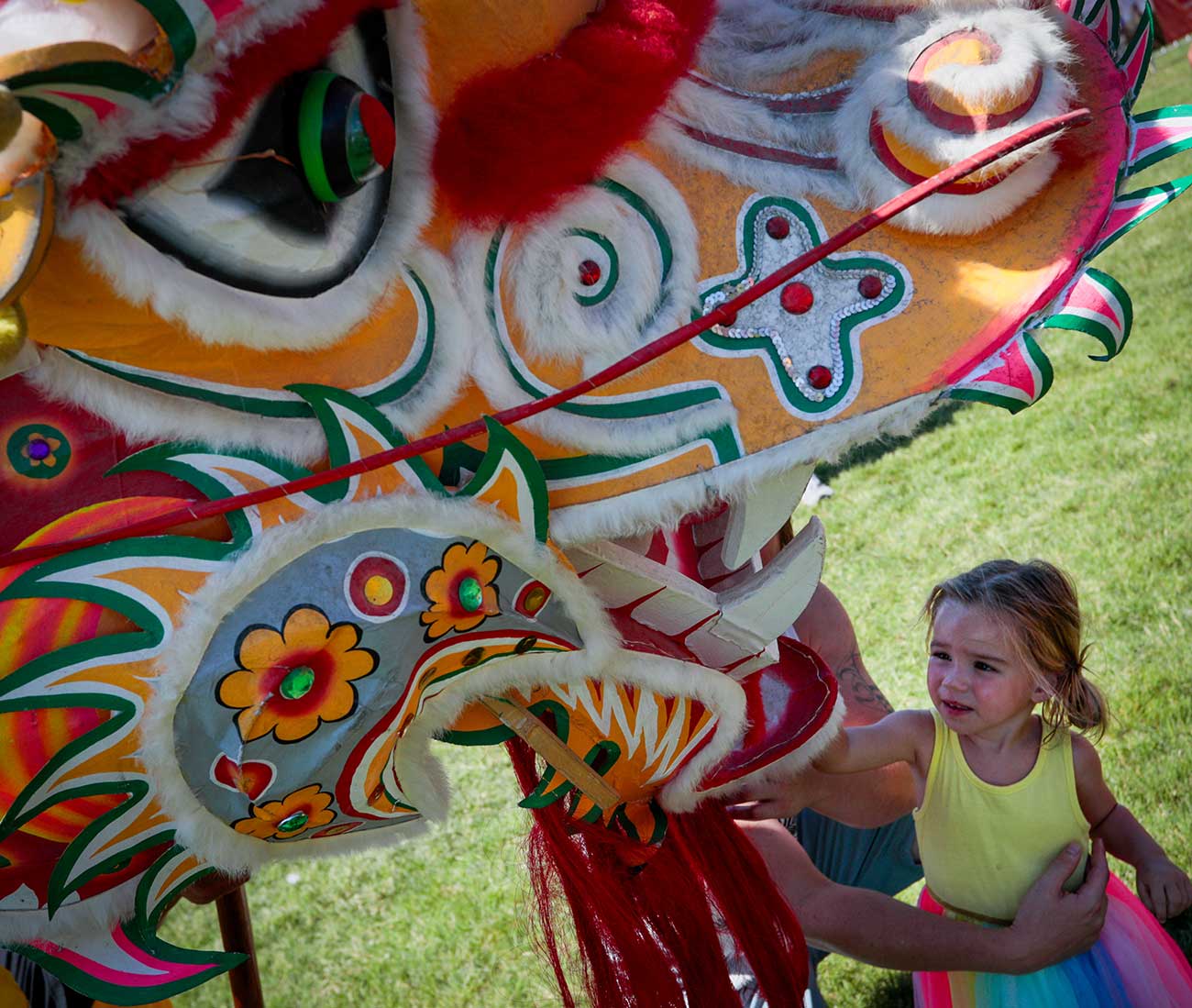
A young attendee checking out the dragon’s head. Photo by Joe Mahoney / Special to The Colorado Trust
During the early days of the pandemic, says VanDan, the importance of saving the festival was immediately obvious to many of the leaders of Denver’s Asian American community. And paradoxically, COVID-19 provided a chance for people who had benefited from the festival to give back to it.
“Suddenly, the AAPI community was receiving more grants and funding to do our work,” says VanDan. “Foundations were saying, ‘We see this horrible thing happening in the Asian community. Here’s some funding to stop Asian hate.’”
Along with working with police departments and community groups to counter hate crimes, organizations like the Asian Pacific Development Center saw a need to direct its attention upstream, and to protect the community’s sources of strength and unity—including the dragon boat festival. The Asian Pacific Development Center shared some of its funding with the festival, essentially providing a lifeline. Moore took a leadership role in virtual town hall events, and publicized vaccines, medical information, small-business grants and a hotline for reporting hate crimes.
“We tried to do everything we could to ensure the safety of our community,” says Moore.
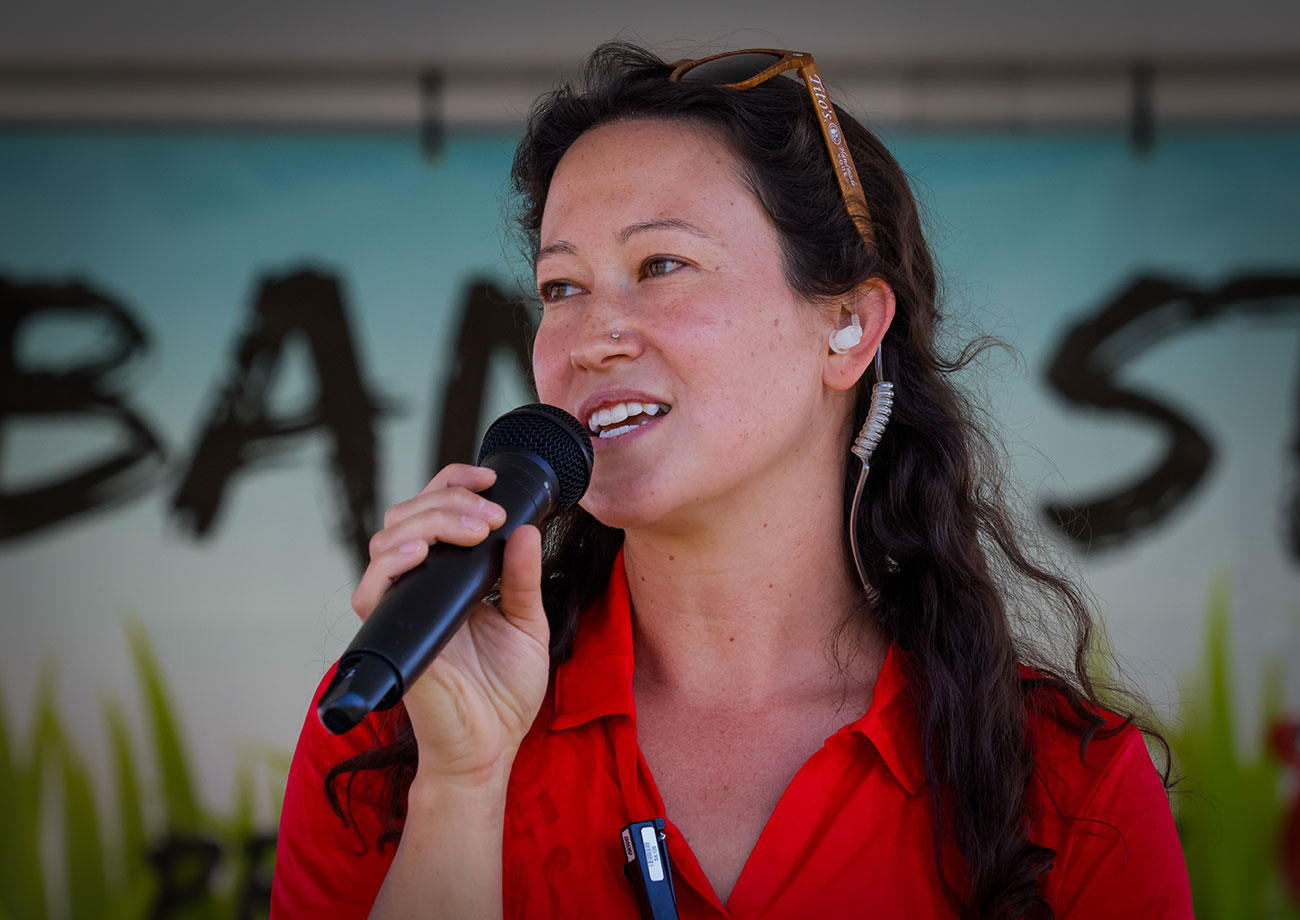
Festival director Sara Moore. Photo by Joe Mahoney / Special to The Colorado Trust
At the same time as the dragon boat festival was getting a helping hand in a difficult time, it was providing one.
Ryan Loewinsohn moved to Adams County in 2020, in hopes of starting a family with his wife. Instead, his marriage fell apart, and he found himself utterly isolated during a global crisis. He didn’t know anyone. He couldn’t shake the feeling that he didn’t belong.
It was his therapist who suggested dragon boating. It seemed like an unlikely solution. Loewinsohn had done a lot of canoeing back in California. But Colorado, to state the obvious, is landlocked, without even so much as a large lake or river.
“It was perplexing to know there’s a watercraft sport here,” says Loewinsohn.
Nonetheless, Loewinsohn started volunteering alongside Moore at the Colorado Dragon Boat Festival. When he asked her about joining a dragon boat team, Moore suggested Nichi-Bei-Go, a team affiliated with the Japan America Society of Colorado.
“Coming out of the pandemic, I was searching for a place I could find that sense of community, camaraderie, growth,” says Loewinsohn. “From something that was trying to bury us in isolation, dragon boat was the exact opposite: warm, welcoming, encouraging.”
Loewinsohn was hooked. He started learning more about the sport, traveling to races and training camps in other states, and working with his team to get stronger.
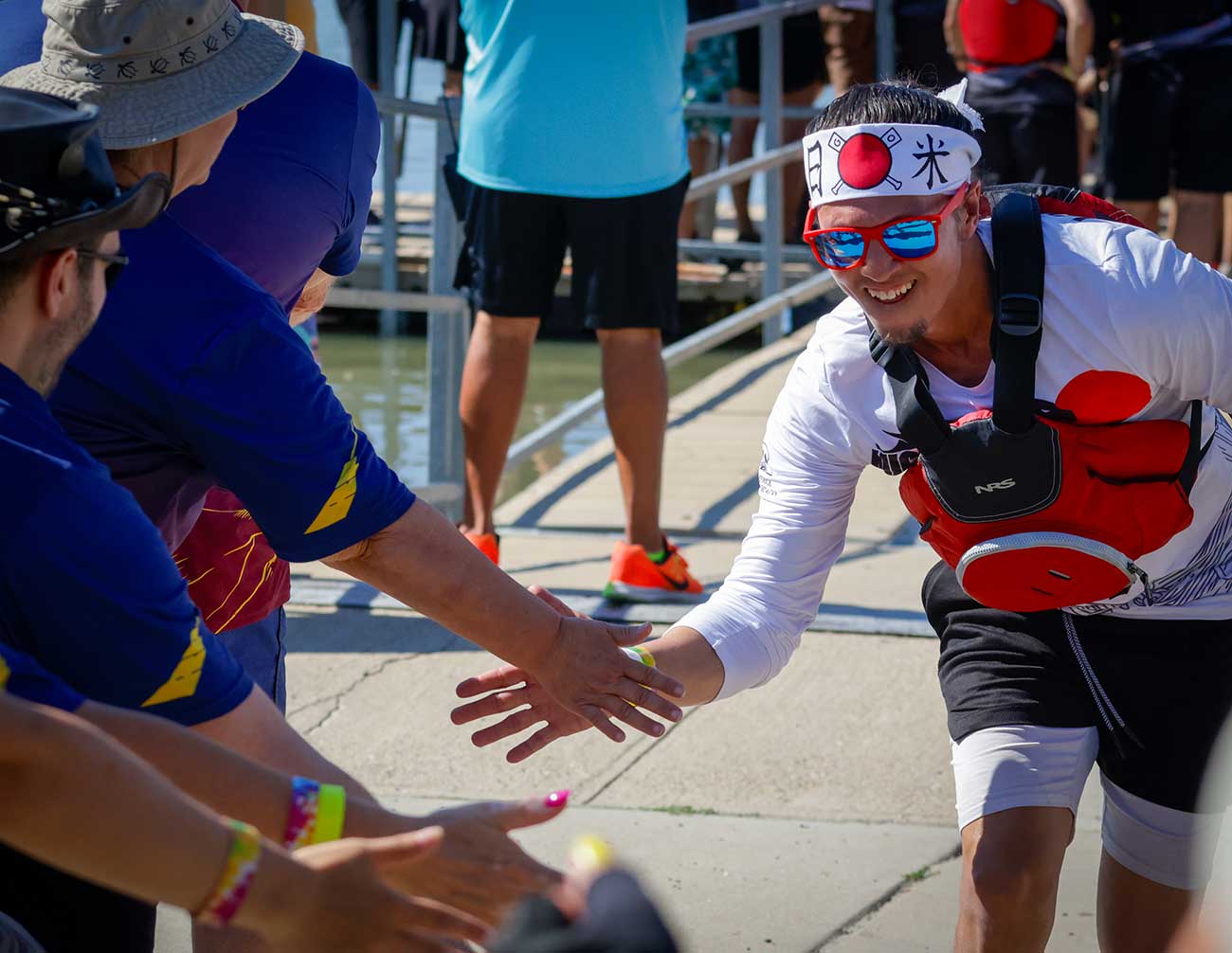
Ryan Loewinsohn celebrating with his competitors after a race. Photo by Joe Mahoney / Special to The Colorado Trust
Jeff Dang credits dragon boating with helping him survive COVID-19, too—in a more literal way.
Dang has been competing and coaching since college, when he discovered dragon boating as a student at the University of Colorado Denver. In 2018, he co-founded the Colorado Dragon Boat Alliance, an organization that provides training opportunities to local teams.
Just a few weeks before a coronavirus vaccine became available in 2021, Dang became very ill with COVID-19. He was intubated and comatose for four weeks. When he woke, he couldn’t walk. His doctors told him that he had lost two thirds of his muscle mass.
“I thought I would be a potato for the rest of my life,” Dang says. But the dragon boat community showed up for him. People he knew well and others he’d barely met came around with piles of food and support.
“Imagining myself coaching again was what pushed me through—knowing I wasn’t done with the sport,” he says. “The community and family part of it all helped pull me through a lot of darkness.”
Dang says he’s stronger now than he was before COVID-19. In 2022, he founded a new team called RPT, short for Relentless Positive Thinking.
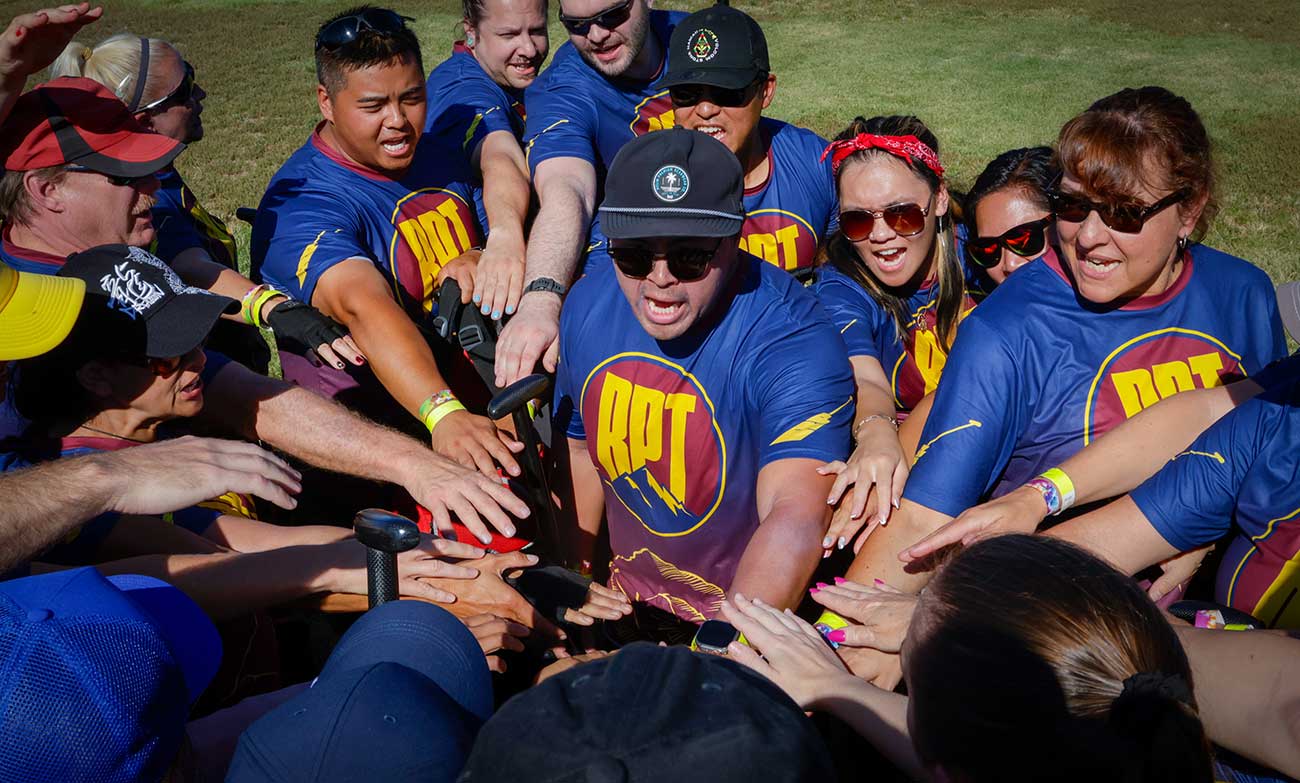
Jeff Dang, center, leads RPT in a cheer before Saturday’s races. Photo by Joe Mahoney / Special to The Colorado Trust
All that positive thinking seems to have paid off on Sunday. RPT won bronze in the premier division of the 200-meter race, edging out Nichi-Bei-Go in a photo finish during a key heat.
Dragon boats have existed for centuries as part of folk celebrations in China commemorating a virtuous poet who lived more than 2,000 years ago. But its modern, racing form was more or less invented by the Hong Kong Tourism Board in the late 1970s, according to the International Dragon Boat Federation. The Hong Kong boats are powered by 20 people, paddling in sync to a drummer at the dragon’s head and with another person steering at its tail.
The sport has taken off dramatically since then. There are now teams in 60 countries. Dragon boating premiered as a demonstration event at the 2020 Tokyo Summer Olympics, a possible first step in becoming an Olympic and Paralympic sport.
For plenty of dragon boat athletes, it’s the sport itself that keeps them showing up.
“I’m very competitive in nature,” says Michael Boyd, who first put together a dragon boat team as a fundraiser in 2003. “For 20 years, I did taekwondo. But you get to a certain point when you can’t do high kicks. [In dragon boat], there are people still competing in their 90s. You can do it at a competitive level for ages.”
In 2007, Boyd brought boats to Denver so that teams could practice before the event. Before that time, most teams were very casual, generally doing a loop in the lake in borrowed boats a day or two before the festival. Plenty of corporate teams paddling in the flag-catching boats at the festival remain casual in their approach to training, but other teams train year-round for the premier races. This year, the festival bought new Hong Kong boats for the competitive teams.
Boyd competed in the 60-and-over division in the dragon boat world championships in Thailand in 2019. He also leads the Phantom Dragons team, which won third place in the premier division of the 400-meter race on Saturday.
For Freddie Tsao, who captains the Agua Libre team, the sport’s connection to Asian culture is secondary to its other attributes. He likes how inclusive it is: it’s open to any gender, any age, almost any ability level. (Some of Denver’s most competitive teams race for Adaptive Adventures, in boats that accommodate various disabilities.) And the community aspect is important; Agua Libre is affiliated with Denver Language School, where his kids go to school.
“This is more of a team sport than football,” says Tsao, who played college football at Texas A&M. “Everybody’s doing the same thing. There’s no one person that stands out. Everyone’s in the limelight. You fail and succeed with everyone doing the same thing.”
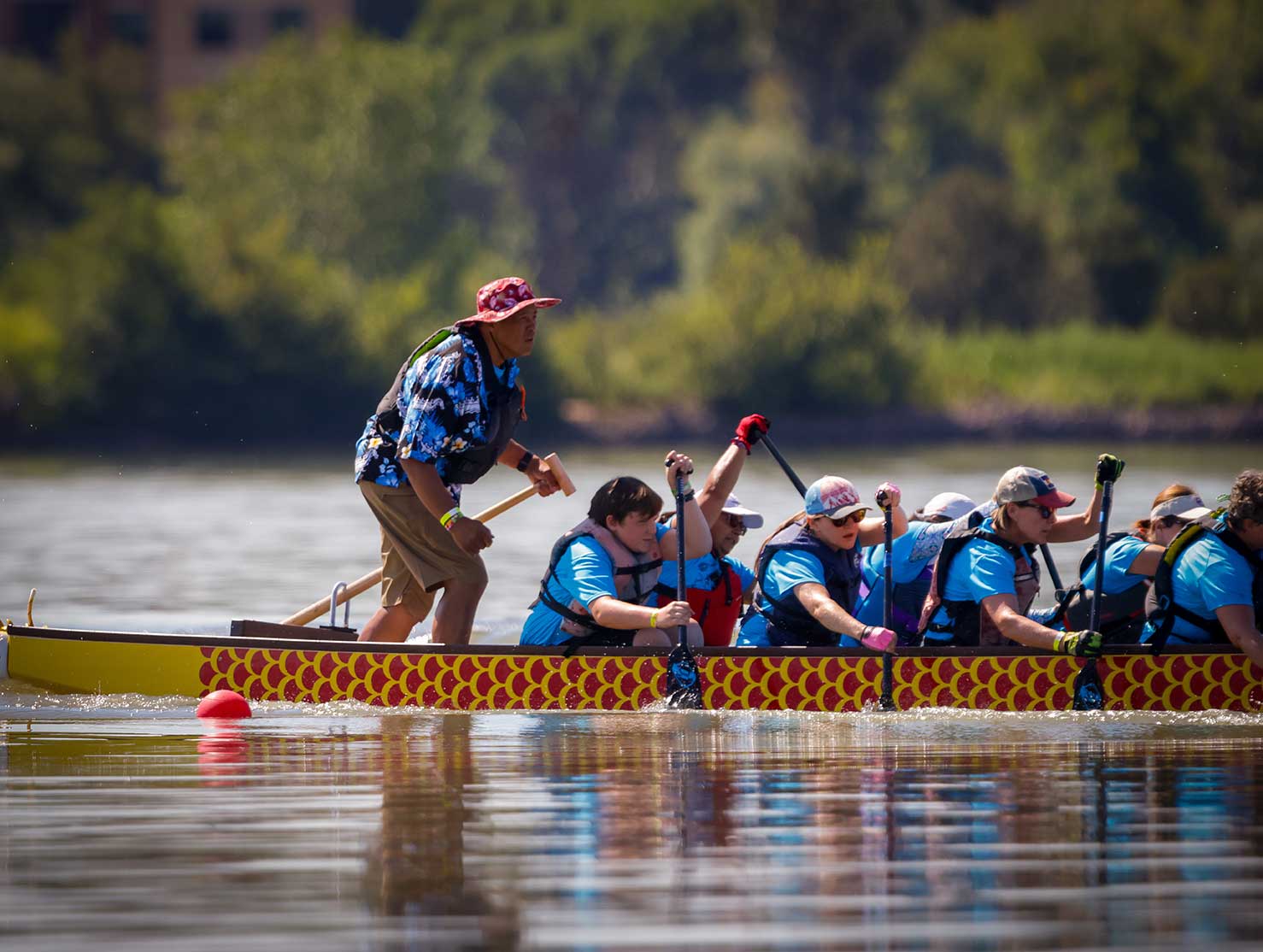
Freddie Tsao at the stern of Agua Libre during a 400-meter race. Photo by Joe Mahoney / Special to The Colorado Trust
The sporting aspect of dragon boating has occasionally come into conflict with the festival’s mission of bringing together Asian American communities. Some of Colorado’s strongest dragon boaters didn’t attend this year’s festival because they were competing at a national championship in Sarasota, Fla. Boyd has sometimes been frustrated that organizers won’t consider holding the festival at a time when there are fewer conflicts—and less brutal heat.
But sticking to the original intent has also made the festival open to a lot of people with only a vague familiarity with or interest in dragon boats. “There’s truly something for everyone,” says VanDan.
On Saturday, its attendees included a group of Coloradans, most of them from South Korea and China, who had been adopted into white families as children. They meet monthly for Asian cultural events, food and movies.
“As an adult, I’m starting to reclaim my culture and my identity,” says Midnite Townsend, a member of the group. Seeing so many people who looked like her, especially as part of a group of adoptees with experiences similar to hers, meant a lot. “There are a lot of Asian organizations that I didn’t know about. It was really cool to see that there are pockets of us in the community.”
She’s thinking of doing more meet-ups with other Asian American groups locally, or learning traditional dances. The Intercountry Adoptees of Colorado even joked about forming a dragon boat team.
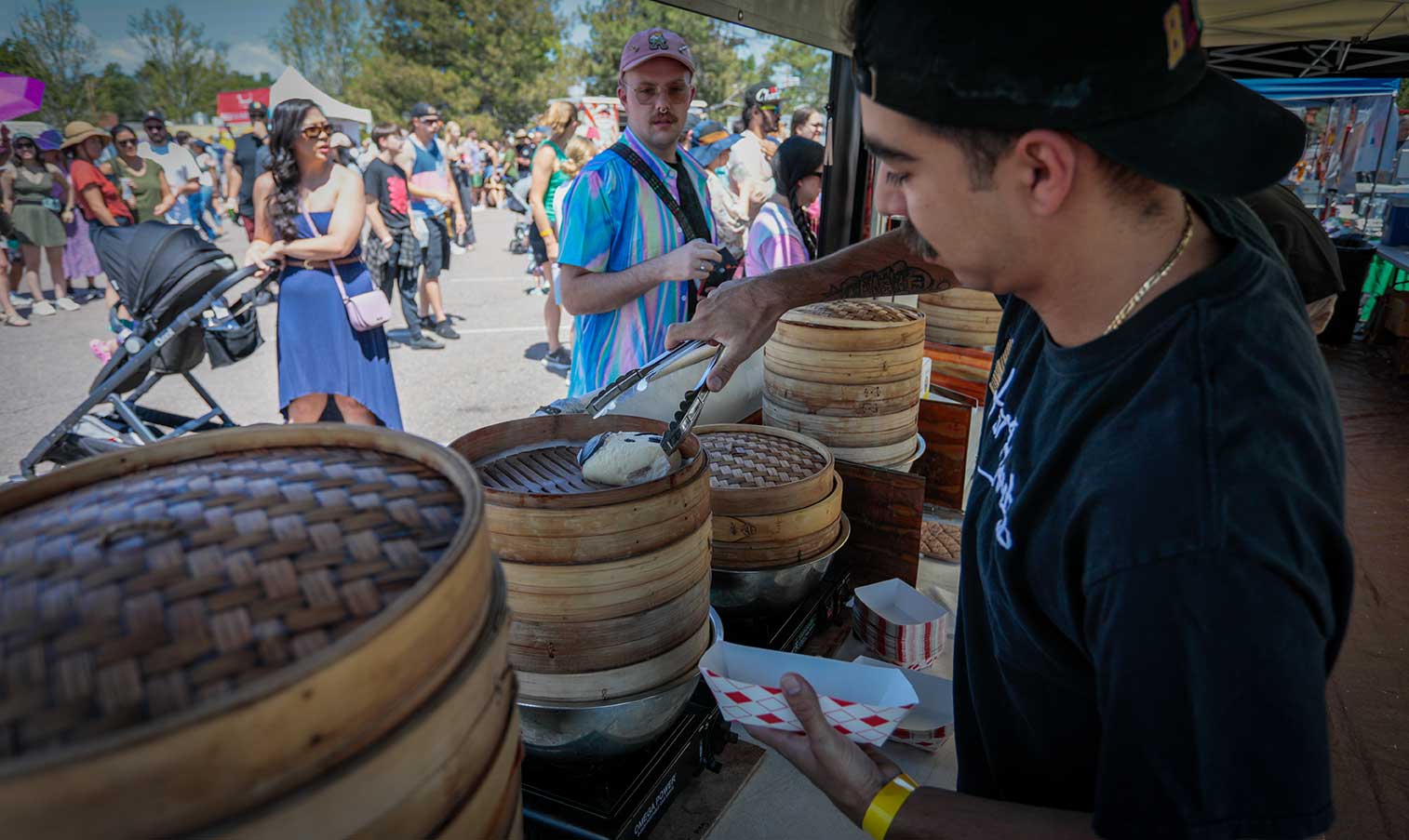
Hot Bamboo sold buns with cute faces. Photo by Joe Mahoney / Special to The Colorado Trust
I spent the festival in a collection of sweltering tents at the edge of the lake, trying to stay cool between races along with about three dozen other people: my teammates.
I joined Agua Libre in April, basically as an appealing way to get some exercise. Also, I was born in Hong Kong, and the idea of getting on a dragon boat offered a jolt of hometown pride. By the end of the weekend, I was filled with pride for Denver.
I’ll be there again next year. Before then, I need to perfect my technique and get stronger. We’re resuming practice in a couple of weeks.
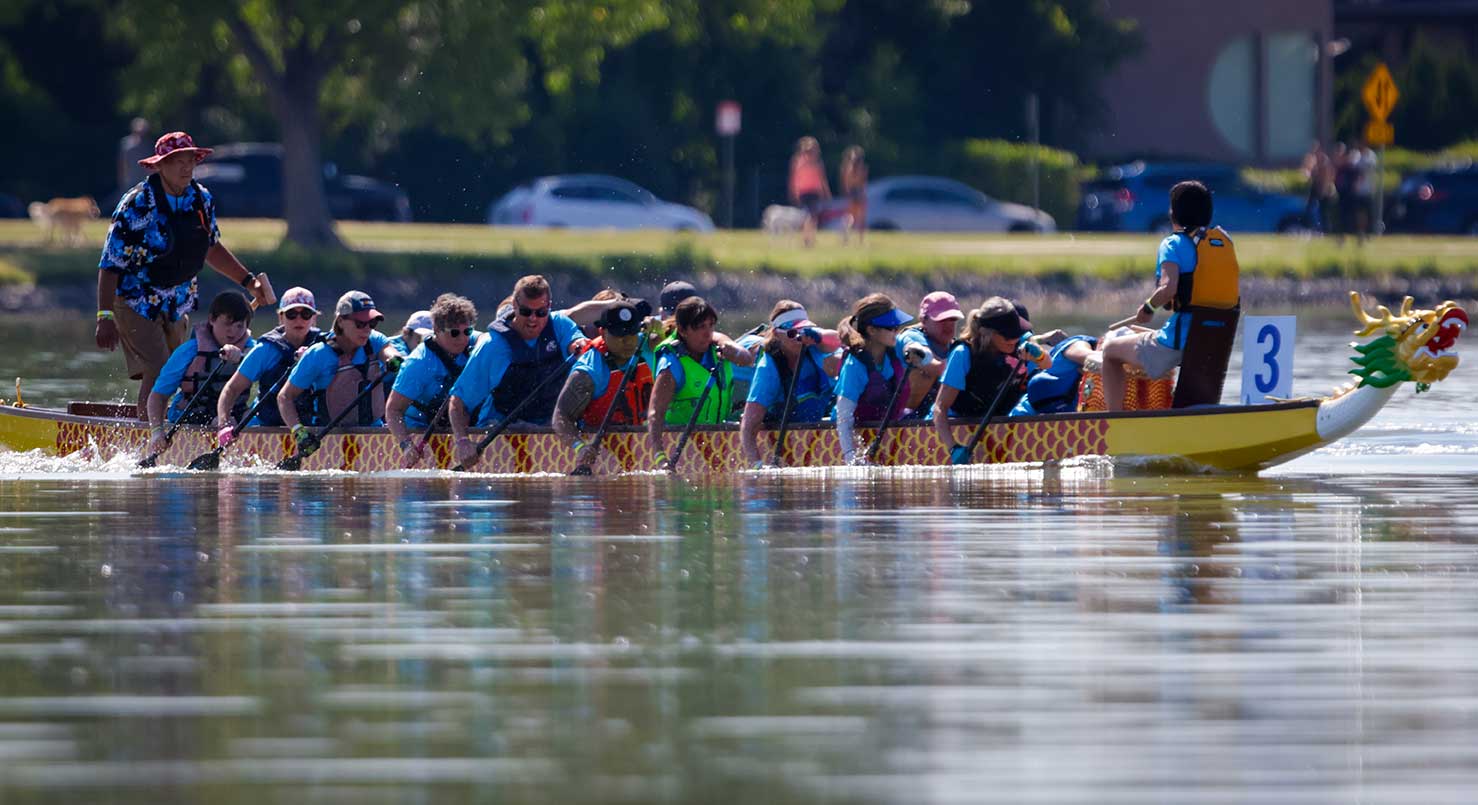
The author’s team. Go Agua! Photo by Joe Mahoney / Special to The Colorado Trust